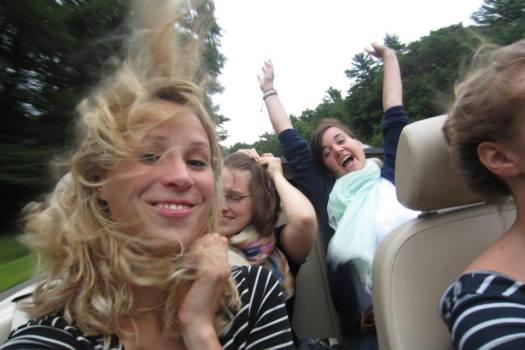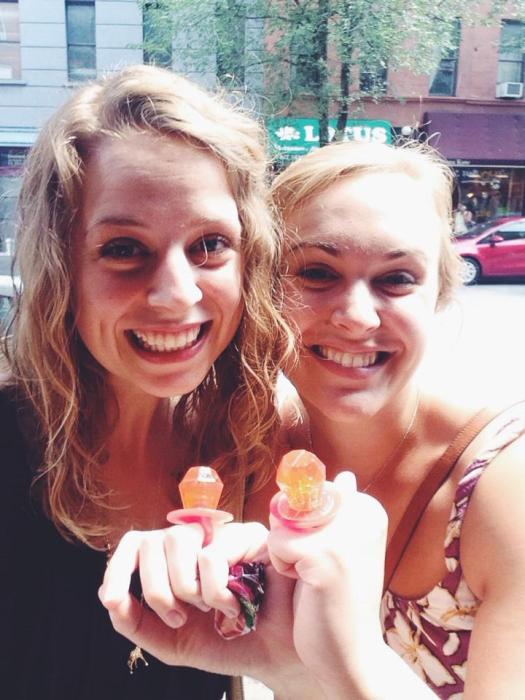
There is a home video of Christmas morning, 1996. My family references it on a regular basis, not just because we enjoy home movies, but because there is a snippet hidden among the frantic gift opening that highlights a common occurrence in our family.
I am standing in front of the camera in a light blue floral nightgown my great-grandmother made me. I am opening a small package, and it’s clear my mother is on the other side of the camera. I’m seven years old and oddly subdued in this video, like my young girlhood is already slipping away and awkward adolescence is making an early entrance. As I open the paper, I see the crimped edge of the wrapping paper, and I remember the new scissors I had just gotten: crimping scissors. I must have thought my mother used similar scissors to cut the paper because I ask her why the edge is like that.
It’s a simple question, a silly question.
My mother cannot answer it.
She tries to respond, words coming out slowly. It’s possible she never went to bed the night before, lack of sleep stifling her ability to record, listen to her child, and respond. She tries to explain that when you get to the end of a tube of wrapping paper, it often has those crimped edges. That no, she did not use special scissors even though it looks like she did.
This is what she is trying to say, but her sentence peters out, dangling in the air, and I stare at the camera in complete confusion before moving on.
~ ~ ~
I’ve been thinking of this moment often these days. It’s been a source of laughter for years, and my mother, a good sport, laughs along with us. What was wrong with me? Why could I never answer your questions? Why do words fail me?!
I’ve been thinking about it, though, because things have taken a turn in our little family of four. I’ve been staving them off since she was born, afraid and unsure of how I would answer, but the questions are now coming in droves. I find myself blinking, like my mother, words trailing off and leaving me with a little girl who thinks she is asking simple questions, who thinks her mother must be daft.
“Mama, why do we all get old?”
I am standing at the kitchen sink washing mugs that can’t go in the dish washer. I think we are having a perfectly normal, unremarkable morning. Evangeline is sitting on the floor behind me and has surrounded herself with colorful blocks in all sorts of interesting shapes and patterns. I turn around and she’s looking up at me from the floor, her short wispy hair crazy from sleep. I wonder how playing blocks got her to such a question.
For a moment, I think. I do not want to instill fear in my almost-three-year-old, but if she’s asking the question, she’s already fearful, isn’t she? My preoccupation with the passing of time fleets through my mind, and I desperately want to spare her a life of scrambling for more.
“Because time doesn’t stand still,” I say, fumbling. “Because we are in time, and we move with it.”
What does that even mean?
I don’t know how to proceed in a way that is both true and gentle.
Our bodies are deteriorating? The earth is spinning on its axis, whipping us around, and our cells are slowly dying until we, too, die?
Everyone you have ever loved will die?
No, no, this will not do.
“Yes, we move with time,” I say again, “and good things happen when you get old. You become wise, you know a lot of things, you surround yourself with people who love you. Being old isn’t all bad.”
She looks at me with a similar face I wear in the home movie: a look of confusion and loving condescension. Poor Mama, doesn’t make any sense, she seems to think, and turns back to her blocks.

Her curiosity and investigative nature are such beautiful parts of her, and I long to nurture them. Yet when I hear her asking such questions and getting different responses from others, I am startled. I want to jump in and clarify: I would have chosen my words so differently! Are you even thinking about how this will have an impact on her little mind? Her little heart? But she will need to learn to become who she is within the vastly different ways of being, and my job is to guide, not to control. I’m just not sure what that looks like.
This is just the beginning, I know this. Every day she gets bigger and more ready for the world, and the world is meeting her even in our own home. She will ask easy and difficult questions, and she will receive a plethora of responses. Right now, she needs us to guide her, to help her determine right from wrong, to help her categorize the catastrophically overwhelming amount of information she is coming in contact with. Later, we can help her break down some of those categories. Later, we can help her see nuance, gray area, uncertainty. I dabble with it now, answering, “I don’t know, honey,” and “It’s kind of a mystery,” and “It’s very complicated science,” and she rolls with it like a champ.
I think of my mother’s slow and incomplete answer to my silly question that Christmas morning, and I am filled with renewed understanding (also, it is not lost on me the depth of my toddler’s question vs. the frivolity of mine!). Question after question begins to wear on you, you lose precision, you tire. My hope is that I tell her this, at least with the important questions. I like to think that I will have the wisdom to ask for a moment, a break before barreling forward into the unknown with my toddler in wondrous awe holding my hand.


















